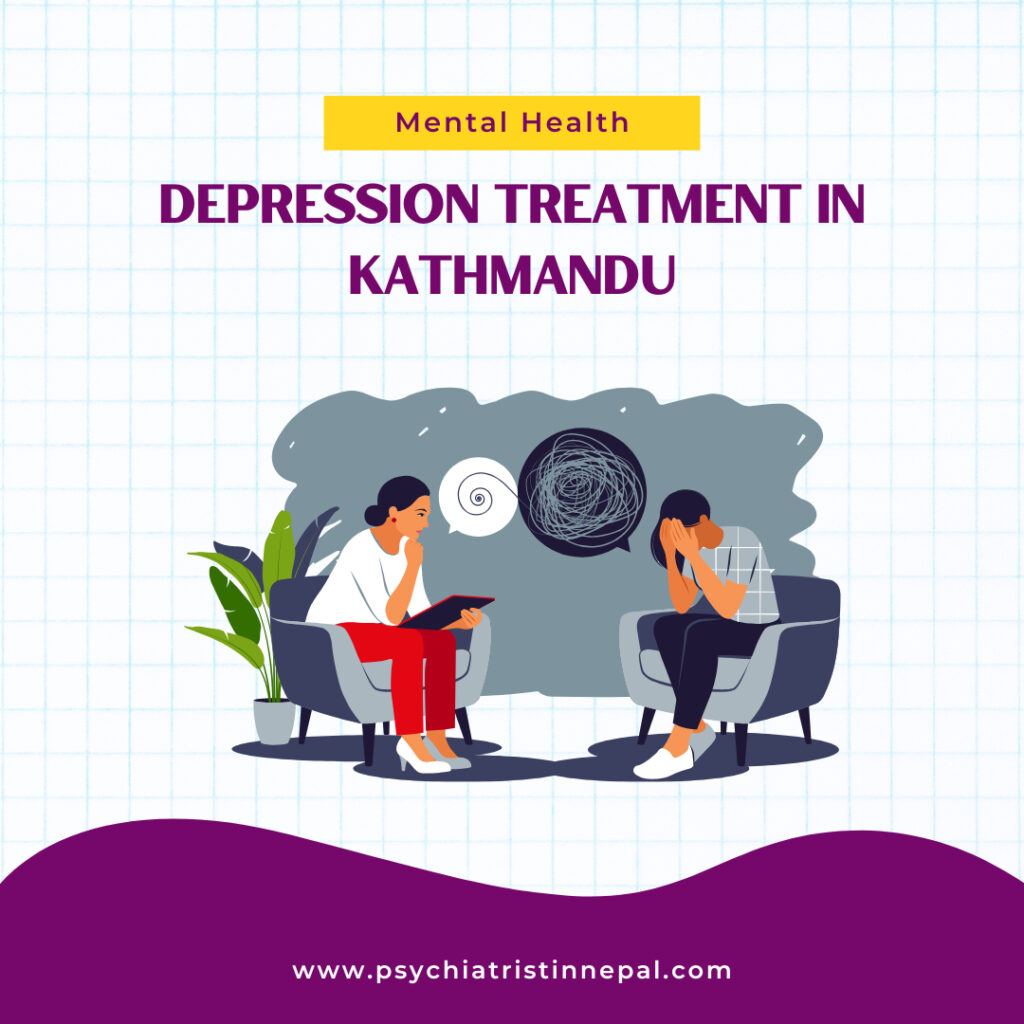13. Depression Treatment in Kathmandu: Symptoms, Causes, Types and Treatment.
Depression Treatment in Kathmandu
What is depression? An overview of Depressive disorder.
Depressive disorder, also known as depression, is a common and serious mental health disorder that negatively affects how you feel, the way you think, and how you act. Depression is different from regular mood changes and feelings about everyday life. It can affect all aspects of our lives, including relationships with our friends, family, and society. Depression can happen to anyone. Women are more likely to have depression than men. Fortunately, it is treatable. If you are being sad all the time and just want to keep crying or becoming highly intolerant and irritable day by day and wondering if might be struggling with depression in Nepal, this blog post is here to help.
Understanding Depression
Depression goes beyond simply feeling low or sad for a short period. It’s a persistent feeling of sadness and loss of interest that interferes with your daily life. Depression does not require a pathological blood test, but there are certain symptoms through which you can indicate that you or someone else might be suffering from depression.
Symptoms of Depression
Here are some of the common symptoms of depression:
- Deeply sad or having a depressed mood most of the day, nearly every day.
- A person may feel a loss of pleasure or interest in once enjoyable activities.
- Difficulty sleeping or sleeping too much.
- Loss of energy or increased fatigue.
- Significant weight loss or gain or a change in appetite.
- The feeling of worthlessness or excessive guilt.
- Difficulty concentrating, making decisions, and remembering things.
- Recurrent thoughts of death, suicidal ideation, suicide attempt, or suicide plan.
These symptoms last most of the day, nearly every day, for at least two weeks or more.
Further, depressive episodes can be categorized as mild, moderate, or severe depending on the number and severity of symptoms, as well as the impact on the individual’s functioning.
Causes of Depression
The exact cause of depression is unknown, but it’s believed to be a combination of biological, psychological, and social factors.
Biological factors: Includes imbalance of neurotransmitters, including serotonin and dopamine. One can also develop depression with a family history of depression (genetics).
Psychological factors: Negative thinking patterns, low self-esteem, and past traumatic experiences can increase the risk of depression.
Social factors: stressful life events, such as the loss of loved ones, job loss, financial problems, or relationship difficulties, can trigger depression.
Types of Depression
There are different types of depression, each with its own set of symptoms. Some of the most common types are:
Major Depressive Disorder (MDD): This is the most common type of depression, characterized by constant or persistent sadness and a loss of interest in most activities, including those that were enjoyable previously. The symptoms must be present for at least two weeks and can range from mild to severe.
Dysthymia: If you have depression that lasts for 2 years or longer,. It’s called dysthymia, or persistent depressive disorder. This is a chronic form that is less severe than MDD.
Bipolar Disorder: This is a mood disorder that causes both episodes of mania (elevated mood) and depression.
Perinatal depression: This type of depression can occur during pregnancy or in the first year after childbirth.
Seasonal Affective Disorder (SAD): This is a type of depression that is triggered by changes in seasons, typically with the onset of winter.
Atypical depression: This type is different from the persistent sadness of usual depression. It is defined by mood reactivity plus weight gain or increased eating, while there is a chance that a positive event can temporarily improve the mood. Some symptoms include increased appetite, sleeping more than usual, a feeling of heaviness in the arms and legs, and being oversensitive to criticism.
Depression Treatment in Kathmandu, Nepal
Depression is treatable. It is very essential to seek support to get rid of depression.
The treatment plan depends on the severity and nature of the depression. Some common depression treatment in Kathmandu available.
Medication: Antidepressant medications can help regulate neuro-chemicals in the brain and improve symptoms of depression. A psychiatrist can usually help you determine if medication is right for you.
Psychotherapy: Also known as talk therapy, psychotherapy can help you develop coping mechanisms, address negative thinking patterns, and improve your overall well-being. Some of the techniques are cognitive behavioral therapy (CBT) and interpersonal therapy.
Lifestyle changes: Getting regular exercise, eating a healthy diet, getting enough sleep, and practicing relaxation exercise techniques help in managing depression.
Electroconvulsive therapy (ECT): In severe cases of depression that do not respond to other treatments, ECT may be an option.
Finding help for Depression Treatment in Kathmandu
If you think you might be depressed, it’s important to seek help from a qualified mental health professional (psychiatrist).
Remember, you’re not alone. Depression is a treatable condition, and with the right support, you can feel better and live a happy life.
About Dr. Kenison Shrestha
Dr. Kenison Shrestha is a qualified psychiatrist practicing in Nepal. He has extensive experience in treating depression and other mental health conditions. If you’re looking for a compassionate and experienced psychiatrist in Nepal, consider a consultation with an experienced psychiatrist in Nepal, consider consultation.

